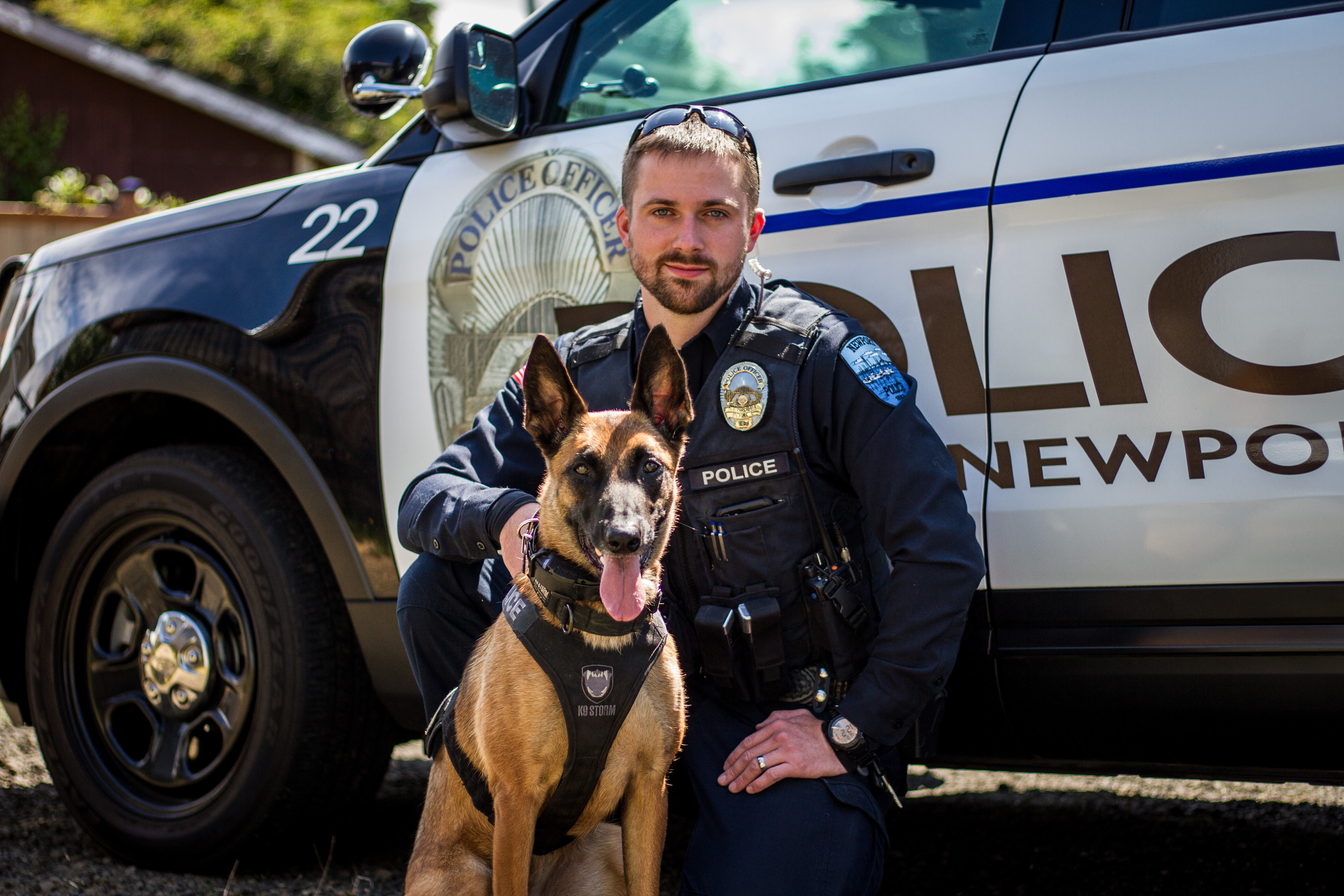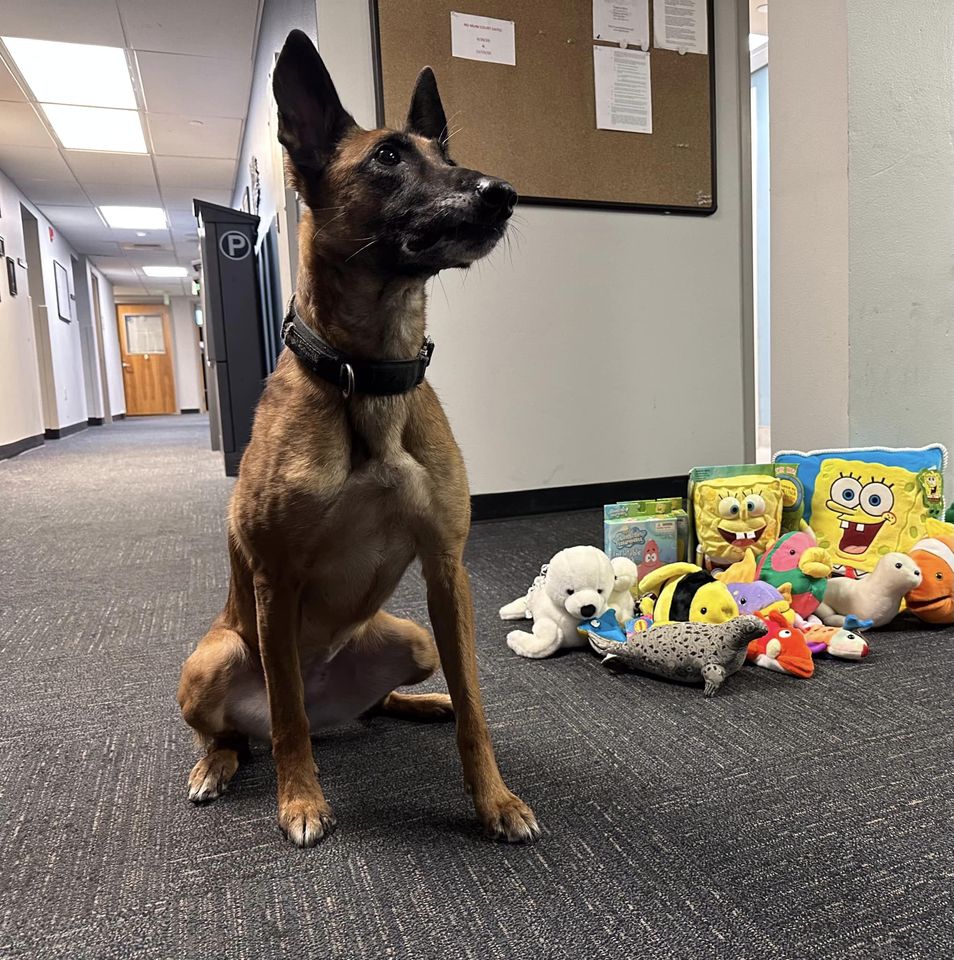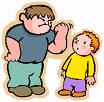Contacts
| Jason Malloy, Chief of Police | 541.574.3348 |
| Patrol | 541.574.3348 |
| Detectives | 541.574.3348 |
| K9 Unit | 541.574.3348 |
| Records Division | 541.574.3348 |
| Community Service Officers | 541.265.4847 |
| Volunteers | 541.574.5866 |
| Dispatch | 541.574.5807 |
| Tip Hotline (ability to leave voice message only - not monitored 24/7) | 541.574.5455 |
| Text-A-Tip (not monitored 24/7) | 541.270.1856 |
| Lincoln County Jail | |
Connect With Us
   |
||||
Frequently Asked Questions
Forms and Documents
| Policy Manual |
| Employment Application |
| Organizational Chart |
| Records Request Form |
| Ride-Along Application — Ride-Along Details |
| SB111 |
| Taxi Driver Permit Application |
| Volunteer Application |
Kids Connection

Click on any of the buttons below to learn more about what you can do.
Hi Kids,
My name is Zoe. I work for the Newport Police Department as a member of the canine team. I am
a Belgian Malinois trained to detect the odor of certain illegal drugs such as methamphetamine, heroin and cocaine. I was trained at the State of Jefferson Working Dogs in Gold Hill, Oregon.
Next to me is my handler, Sergeant Aaron Bales. 
Since I am a working dog and trained to do special jobs with police officers, you should ALWAYS ask permission from my handler first before petting me. It's a good idea to ask the owner before petting any other dog, too. All dogs can get scared and might bite if they don't know you.
I'm here to help you stay safe, and together we can find out what to do in emergencies. Are you ready to read along with me?
9-1-1 --- If you need to call for help...
Sometimes emergencies happen and you might not know what to do or who to call. Even grown-ups don't always know what to do. You could save someone's life if you know what to do in an emergency. First, stay calm. Take a deep breath. Then, call 9-1-1 right away.
When you call 9-1-1, the operator will ask you if you need police, fire, or medical help. If you aren’t sure, just explain what's going on and the operator will know what to do from there. The operator will ask you some questions.
If you can't remember 9-1-1, just dial "0" for the operator. If you are away from home and are near a pay phone, just pick up the handset and dial. You don’t need any coins to call 9-1-1 or “0” for the operator.

 It's okay to tell the operator your name and your age. If you are calling from a home telephone, you don't need to know the address. The address will automatically show up on the operator's computer screen. If you are calling from a cell phone, the computer won't be able to tell exactly where you are. So, the operator might ask you if you can see any street signs or large buildings in the area. They need that information so they know exactly where to send help.
It's okay to tell the operator your name and your age. If you are calling from a home telephone, you don't need to know the address. The address will automatically show up on the operator's computer screen. If you are calling from a cell phone, the computer won't be able to tell exactly where you are. So, the operator might ask you if you can see any street signs or large buildings in the area. They need that information so they know exactly where to send help.
 Stay on the phone until the operator tells you that it is okay to hang up. The operator might ask you questions while help is on the way. Speak loudly and clearly, and answer the questions the best you can.
Stay on the phone until the operator tells you that it is okay to hang up. The operator might ask you questions while help is on the way. Speak loudly and clearly, and answer the questions the best you can.
 You should only call 9-1-1 for life and death emergencies. An emergency is when someone is very sick or injured and they need medical attention right away, if you see a crime in progress, or there is a fire.
You should only call 9-1-1 for life and death emergencies. An emergency is when someone is very sick or injured and they need medical attention right away, if you see a crime in progress, or there is a fire.
 Sometimes when we make telephone calls, we dial the wrong number by mistake. If you dial 9-1-1 by mistake, that’s okay. Don’t hang up. Wait until the operator answers and tell them you dialed the wrong number. If you hang up without talking to the operator, they will think something is wrong and will send a police officer to your home to make sure everything is okay.
Sometimes when we make telephone calls, we dial the wrong number by mistake. If you dial 9-1-1 by mistake, that’s okay. Don’t hang up. Wait until the operator answers and tell them you dialed the wrong number. If you hang up without talking to the operator, they will think something is wrong and will send a police officer to your home to make sure everything is okay.
What if something is on fire?
Call 9-1-1 right away! If there is a fire at your home, get out of the house immediately and go to a neighbor's house to call 9-1-1. Never call 9-1-1 from inside a burning building. Your safety always comes first!
If you smell smoke, see flames or hear the smoke alarm:
Yell, "Fire!" and get out of the house. If there is a layer of smoke, crawl on the floor so you are underneath the smoke. Don't go back inside for any reason.
Run to a neighbor's house and ask them to call 9-1-1 immediately. Never call 9-1-1 while inside a burning building. Your safety comes first!
If you live in a tall building, calmly leave your apartment, close the door behind you and pull the fire alarm closest to the nearest exit. Walk down the stairs to the ground floor and leave the building.
Never take the elevator during a fire!
Never try to put out a fire yourself, no matter how small it is.
If you are the person calling 9-1-1, tell the operator your name and what's happening. They'll ask you lots of questions while fire rescue is on the way, so don't hang up until they say it's okay.
If your clothes ever catch fire, remember these three words: stop, drop and roll.
Stop where you are
Drop to the ground
Cover your face and roll over and over until the flames are out
You can practice this with your friends so you will know exactly how to do it if your clothes ever catch fire!
Be safe on the Internet
Isn't it fun to explore the Internet? It has everything from really cool games to information that can help you get an "A" on your homework. Millions of kids like you surf the 'net every day. But, be careful if you enter chat rooms. People don't always tell the truth about who they are, or why they're online. Sometimes adults enter chat rooms pretending to be kids like you. And that's dangerous!
The first step to safe surfing on the Internet is knowing what your online boundaries are. Avoid a hassle later by asking a parent now - when can I go online? What sites can I visit? How long am I allowed to surf the Net?
Keep your identity a secret. Don't give out your full name, home address, school name, your photograph, or your telephone number to someone you meet online.
If your new online friend wants to get together to meet you - STOP! First, discuss it with your parents or guardian. If they approve, you and your online friend should arrange to meet close to home in a public place, like the mall or a restaurant. Both of you should bring an adult to the first meeting. Better safe than sorry!
If you ever get an instant message or email that makes you feel scared, confused, or uncomfortable, don't answer it. You need to tell an adult you trust, right away. They can decide if it should be reported to the police or your Internet service provider.
Some websites ask for information about you. They might want your name, address, phone number and email address. Usually, they ask so they can email you updates about their product or service. Don't ever give them that information unless you have a parent's okay.
Don't open emails from senders you don't know. Some might be an attempt to sell you something you didn't ask for. Others may contain a virus that can damage your computer.
 When in doubt, hit delete!
When in doubt, hit delete!
I think I'm lost!
It happens to almost every kid at least once - you're in a store, looking at a new toy or game, then suddenly you look up and Mom or Dad is gone! You're lost! What should you do?
The most important thing is to stay calm. Remember, an adult would never leave without you. First try loudly calling the adult you are with. They might be around the corner, just out of sight.
If youa re in a store, find someone who works there and tell them what happened. Usually people who work in stores wear a uniform or a name tag, or stand behind a counter near a cash register. They can help find the grown-up, fast.
If you can't find a store employee, stand still and don't move. The grown-up you came with might be searching for you. Give them a chance to find you.
If you're going to a theme park or another place with lots of people, the best thing to do is stick close to the adult in charge or others in your group. It's best to use the "buddy system", so you always stick with a "buddy" during the activity. When you arrive, adults and kids should come up with a plan, so everyone knows what to do if someone gets separated from the group.
Pick a meeting spot that's easy for everyone to find and remember. If someone gets separated, everyone must meet at that spot. If you're not sure how to get there, stand still and don't move.
Give the grown-ups looking for you a chance to find you.
You can always ask an employee for help. Look for people wearing uniforms or name tags. They'll know how to get you back to your group.
If you get lost outside, the two most important rules are: stay calm, and stay put. Adults who are looking for you can't find you if you are moving from place to place. Find a spot to wait near an open space, where people could see you.
Somebody is picking on me!
 Does another kid pick on you all the time? Call you names, try to trip you, take your things without permission, or push you? Sounds like you're dealing with a bully! A bully can be a boy or girl, one person or a whole group. Their actions can make you feel scared, sad, embarrassed, and even sick.
Does another kid pick on you all the time? Call you names, try to trip you, take your things without permission, or push you? Sounds like you're dealing with a bully! A bully can be a boy or girl, one person or a whole group. Their actions can make you feel scared, sad, embarrassed, and even sick.
Everyone, big or small, young or old, has the right to be treated with kindness and respect, and to feel safe. Bullies may act tough, but inside they are really cowards. Here are some things you can try to get those bullies to back off:
You can try talking to them. Calmly say, "Why are you being mean to me?"
Walk away and ignore them. Sometimes, bullies think it's fun watching you react to something they say to you. If you ignore them, it won't be fun anymore and maybe they'll go away.
Make a joke. If you say something funny and laugh with them, the bully might forget to pick on you. If they pick on you a lot for the same thing, think of some lines you can use on them next time. Then, practice with a friend or adult.
Speak up. Loudly say, "Stop picking on me!"
Stick with your friends. Some bullies don't like to approach kids when they are with a group. They would rather corner someone when they are alone, and when there are no adults around.
Avoid places where the bullies hang out. If you can, take a different route to class, or home from school. Or leave a little earlier or later.
Tell an adult. If you've tried to solve the problem yourself and aren't getting anywhere, tell your parent, a teacher, counselor or the principal. Chances are the bullies could be picking on other kids too, and that's a problem an adult should handle.
If a bully is doing something that hurts you - like punching or kicking - tell an adult immediately.


